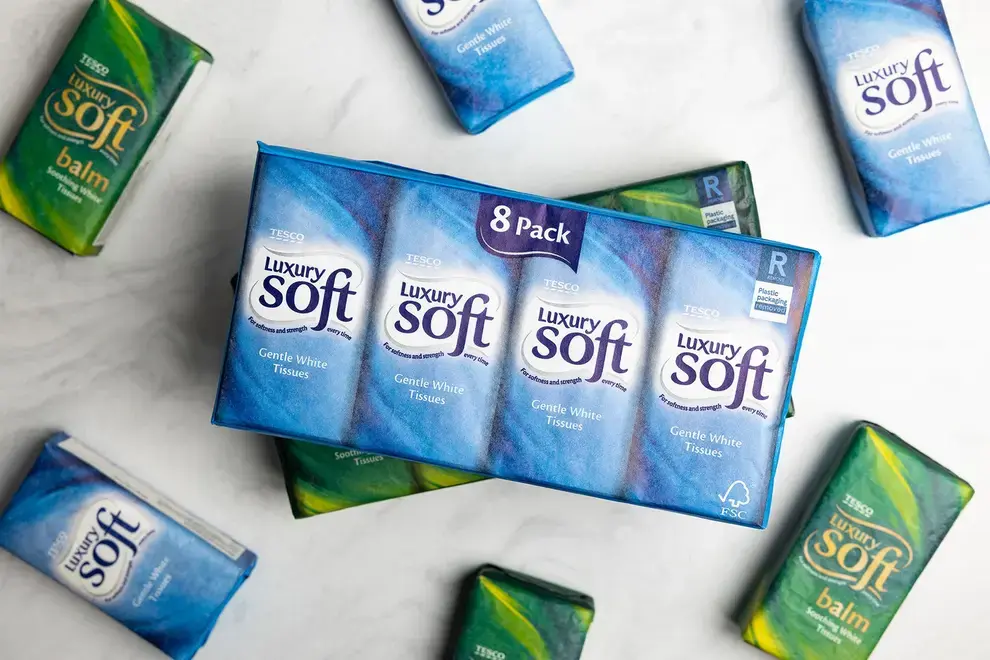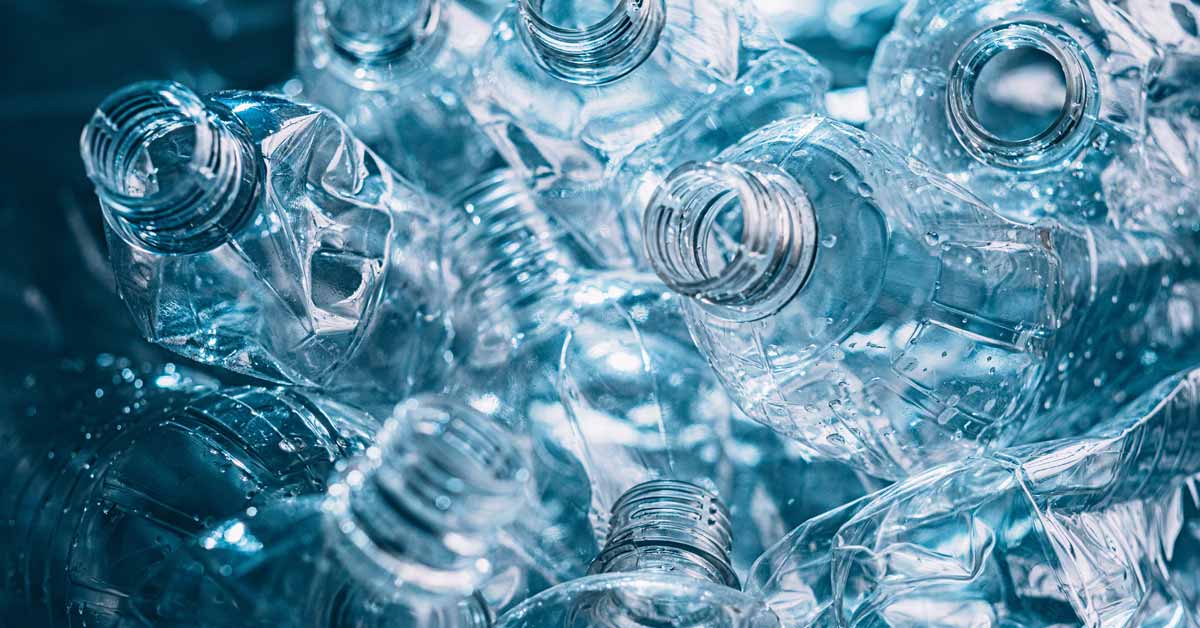3 min read
New Year, New Paper Packaging Alternatives: More Companies Are Making the Switch
ResourceWise
:
Jan 4, 2024 12:00:00 AM

As we enter the new year, sustainability remains a top priority for individuals worldwide. So, what better way to start the new year than by exploring the diverse range of paper packaging alternatives companies are looking for from the pulp and paper industry.
Tesco Launches Paper-Wrapped Pocket Tissues to Save 35 Tonnes of Plastic
Tesco has taken a significant step towards sustainability by introducing paper packaging for its pocket tissues. By making this change, the UK's largest supermarket aims to prevent the creation of approximately 35 tonnes of new soft plastic annually. Moreover, Tesco's decision to switch to paper packs for their own-brand pocket tissue multipacks will eliminate over 55 million pieces of soft plastic.
Since mid-December, both the individual packs and the wrapping surrounding the multi-packs of Tesco's Gentle White and Balm tissues have transitioned into Forest Stewardship Council (FSC)-certified paper packs. Read more at www.independent.co.uk

Local Coca-Cola Bottler to Replace 200,000 Pounds of Plastic a Year with WestRock Paper Packaging Solution
WestRock has partnered with Liberty Coca-Cola Beverages, a local Coca-Cola bottler, to supply its PETCollar Shield Plus to replace the traditional plastic rings. PETCollar Shield Plus is a part of WestRock's PETCollar product family, which offers a range of multipack clip solutions in various sizes, designs, and configurations.
Liberty's Philadelphia production facility will use the paper-based carriers to package Coca-Cola's top brands in multipacks, including their popular 12-ounce and 16.9-ounce products. The installation of this new paperboard carrier packaging system is expected by the summer of 2024. Read more at www.westrock.com
Stora Enso Commits to Net-Zero Carbon Emissions by 2040
Stora Enso is making a firm commitment to achieve net-zero carbon emissions by 2040 through its participation in The Climate Pledge. This progressive step aligns with Stora Enso's long-term goal of becoming net carbon-positive and offering fully regenerative products and solutions by 2050.
The company remains dedicated to fulfilling its 2030 target of reducing Scope 1, 2, and 3 emissions by 50% from the 2019 baseline, a target that has been endorsed by the Science Based Targets initiative. Additionally, Stora Enso aims to enhance its Scope 3 performance by optimizing efficiency and reducing carbon intensity throughout its value chain, working closely with its suppliers, logistics partners, and customers. Read more at www.news.cision.com
Fromagerie Milleret Launches Premium Cheeses in Amcor’s Recyclable Paper Packaging
Cheese producer Fromagerie Milleret has collaborated with Amcor to create innovative paper packaging for their esteemed Le Baron Brie and l'Ortolan Bio premium cheeses. To achieve this eco-friendly solution, Fromagerie Milleret will utilize Amcor's AmFiber Matrix, a recyclable and breathable wrap that aligns with their commitment to sustainability. This groundbreaking packaging can be easily recycled in existing paper streams, further enhancing the environmental credentials of these delicious cheeses. Read more at www.packagingworldinsights.com

Metsä Board Offers New Packaging to SchokoSchatz Chocolate Brand
Metsä Board has offered its innovative packaging solution for the SchokoSchatz chocolate brand. The packaging is its MetsäBoard Prime FBB EB, which is not only recyclable and compostable, but also features a dispersion-coated barrier that effectively protects against grease and moisture.
This unique feature allows the packaging to not only serve as a safe material for the outer packaging but also enables the use of cardboard to wrap the delightful surprises inside the chocolate sphere instead of plastic. Metsä Board's commitment to sustainability is evident in their use of fresh fibers sourced from sustainably managed Nordic forests. Read more at www.metsagroup.com
Smurfit Kappa Designs Freestanding Cardboard Cup Recycling Box
Smurfit Kappa has teamed up with Valpak to create an innovative cardboard cup recycling box that is perfect for storing empty beverage containers. This fully recyclable pack is specifically designed for easy transportation to waste collectors. With Valpak's requirements in mind, this cup recycling box is complete with dividers. These dividers create nine internal compartments, allowing you to neatly stack your cups inside.
To seal the box securely, they have also designed a lid with perfectly aligned holes for each compartment. To make it even more convenient, a separate layer pad can be clicked underneath the lid once the box is full, ensuring that the holes are sealed and the box is ready for recycling. Plus, you'll find a handy QR code included on the box, linking directly to the National Cup Recycling Scheme. This makes it incredibly simple for customers to arrange collection of the box and contribute to a sustainable future. Read more at www.packagingeurope.com
Sirane Offers Recyclable Butter Wrap in Its Sustainable Earth Packaging Range
Sirane has expanded its sustainable Earth Packaging range by introducing a new addition - plastic-free and recyclable butter wrap. This innovative product offers various barrier options, including a metallic effect that gives a classic touch with silver and gold papers.
Known as Earthfilm Butter-Wrap, this packaging solution utilizes coated papers that provide a convenient and easily recyclable alternative to the commonly used butter-wraps in the industry. What sets it apart is that all the coatings used are eco-friendly water-based barrier coatings, ensuring the necessary grease and moisture barrier. Even the print option is eco-friendly, making this product a truly sustainable choice. Read more at www.sirane-flexibles.com

Pulp Mill Waste Useful as Organic Fertilizer, Suggests Research
Research conducted by the University of Alberta suggests that instead of being dumped in landfills, pulp mill waste can be repurposed as an organic fertilizer to enhance soil quality and promote tree growth. This study found that incorporating biosolids, including wood and other fibers leftover from pulp and paper production, into the soil not only reduced harmful greenhouse gas emissions but also improved soil fertility. The two-year investigation, conducted on a hybrid poplar tree plantation in northern Alberta, demonstrated the benefits of combining biosolids with conventional fertilizers for sustainable agriculture practices. Read more at www.ualberta.ca




![[Video] Molecules to Markets Episode 1: Chemical Markets Begin 2026 in a Supply-Driven, Margin-Sensitive Environment](https://www.resourcewise.com/hubfs/images-and-graphics/blog/chemicals/2026/weekly-video-series-molecules-to-markets/CHEM-Weekly-Video-Series-Molecules-to-Markets-Episode-1.png)
